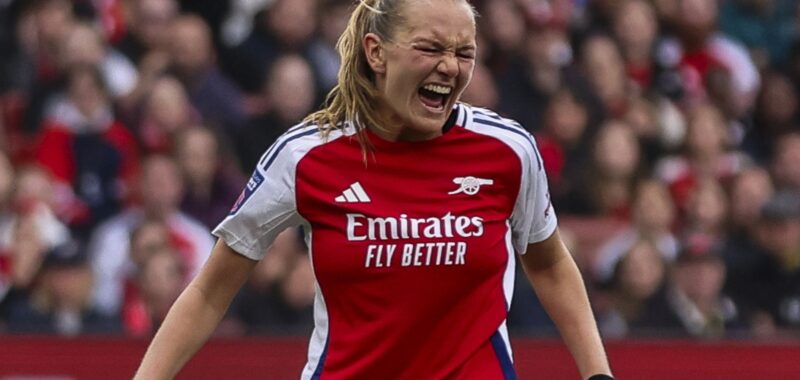It feels slightly jarring to be talking about season-defining fixtures three weeks into a new campaign, but Arsenal’s puzzling start has prompted the conversation.
Their most recent result, a lifeless draw against Everton, was particularly deflating as an inability to break teams down reared its ugly head once more.
This is not the first time Jonas Eidevall has faced tactical examination. It’s unlikely to be the last. But it just so happens that Sunday’s stalemate was the warm-up for a huge week in the fixture calendar, where Arsenal travel to Bayern Munich before hosting Chelsea at Emirates Stadium.
Familiar problems are resurfacing. A running theme of the Eidevall era has been a wastefulness in front of goal, and on paper, there seems to be little conceivable justification for such profligacy. The Gunners have a treasure trove of high-profile forwards – Beth Mead, Alessia Russo, Stina Blackstenius – who are all able to rotate across a fluid frontline.
They signed Mariona Caldentey in the summer, who adds versatility, and to complement further, Caitlin Foord and Frida Maanum offer potency. But something feels off. Across their three opening WSL games, Arsenal have only managed 14 shots on target, which ranks sixth among teams to have played the same number of games. Their three goals puts them eighth.
You have to go all the way back to March 2009 to find the last time Everton kept a clean sheet against Arsenal. Goal-machine Julie Fleeting and Lionesses icon Rachel Yankey were in the Gunners’ squad. Gordon Brown was still Prime Minister.
The data tells a compelling story. Arsenal completed 221 final third passes (for context, Everton completed 23), had 45 touches in the opposition box, 21 shots, but only five hit the target – of those five, all were taken outside the box. Maanum’s seven attempts represented a league-high.
But clear-cut openings were so few and far between that Arsenal finished the game with an expected goals value of only 0.74, despite being camped in the Everton half – Laia Codina and Emily Fox were the only two outfield players to spend more time in their own defensive half.
None of that breakdown serves to inspire confidence, particularly given Arsenal’s assortment of attacking riches. “I think we should have much higher demands and standards on ourselves in our attacking game,” Eidevall reflected afterwards. Correcting that reality ahead of a hugely defining week is now Eidevall’s greatest challenge.
Zoom out, and the wide angle paints an even grimmer picture of the problems Eidevall faces. The contrast is stark. Arsenal top the charts for big chances created this term, but sit rock bottom for big chances converted, having scored two of 10, missing eight. Their nearest rival is Tottenham, who have missed six.
Perhaps there is something off about the complexion of Eidevall’s starting selections. It seems odd that both Russo and Mead were dropped for the opening game against Manchester City, while Foord and Steph Catley are unable to nail down a regular place.
Bizarre, too, that Arsenal are yet to find a formation that fits. So far, Eidevall has toyed with a 4-2-3-1 against City, a 4-4-2 against Leicester and a 4-3-3 against Everton. None have looked like an overly convincing recipe for scoring goals.
All that said, this is not the time for knee-jerk reactions. Besides, that’s not Arsenal’s style. They have Mikel Arteta as living proof that a long-term vision and belief in a strategic plan can bridle many of football’s most fierce criticisms. It helps if you can win football matches, too.
Eidevall has won 49 of his 69 WSL matches (D10 L10) and victory against Chelsea this weekend would make him the second-quickest manager to reach the 50-wins milestone, behind only his predecessor Joe Montemurro, who did it in 66 games.
After all, this Arsenal squad is too talented to be struggling, now it’s down to Eidevall to turn fault-finding into fuel for success. A statement win against Chelsea on Saturday would be a good place to start.





